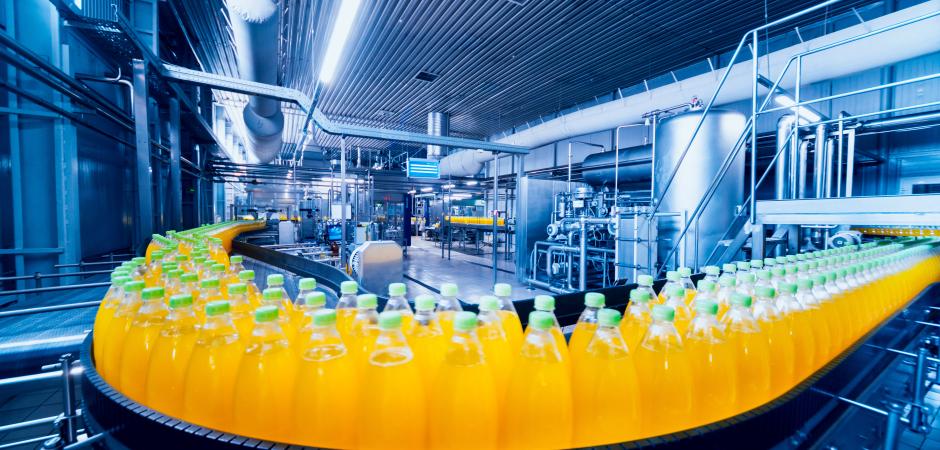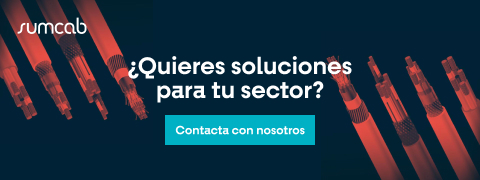
The food sector has different characteristics which vary depending on the production phase in which they are found. Therefore, different types of cables are needed to apply to each zone within a food plant.
This sector focuses on everything from meat packaging to bottling factories, grain milling, dairy processing, other food packaging, etc. Each of the production processes is related to the type of work.
Having a large product portfolio does not mean the identification of cables for the food sector is difficult. At Sumcab we are clear which cables are applied in this industry and which are optimal to meet the needs of our clients.
Also, what is best is to know the characteristics of the cables which are most used in the food sector. In order that their properties adapt to each installation, but always maintaining quality, resistance, durability and safety.
Influential factors in the food sector
Each installation has different characteristics, but in the food sector there are some common factors among all companies. These requirements are as follows:
Cold storage
Many foods require conservation at low temperatures or even undergo cold treatments, in order to increase their shelf life and eliminate any risk they may have from microorganisms.
Currently, many cables are capable of offering optimal operation at temperatures down to -25ºC, guaranteeing their correct performance at such temperatures below zero in fixed installations.
When we talk about industrial cold storage, we refer to processes such as refrigeration or freezing and temperatures that can reach -40ºC. Therefore, cables installed in these types of areas must be fully prepared to cope with these temperatures.
Cleaning in processing plants
Very high levels of disinfection are required in food processing plants to maintain adequate cleanliness.
Such cleaning often must use water applied under pressure from hoses directly on to equipment and each infrastructure.
Cables in the food sector which are present in these spaces must offer total resistance to water and not deteriorate or be damaged by direct contact. So, they usually have a non-permeable outer coating, among other characteristics.
Safety against fire
The risk of fire exists in any treatment plant, also in the food sector.
The safety requirements, in this regard, have very demanding regulations and, depending on the area in question, the cables used must be designed with specific fire resistance features.
Generally, in these installations so-called AS+ cables are implemented, which must also comply with UNE 211025 regulations, with respect to fire resistance, which indicates the following requirements:
- Prevent the spread of the fire as far as possible.
- Present little or no emission of polluting gases (halogen-free).
- Offer optimal light transmittance in the event of fire, to ensure good visibility despite fire and smoke.
- Cause minimal corrosive effects, in order to preserve connected equipment and devices.
- Enable the electrical service of emergency elements to be maintained.
Official certifications for cables in the food sector
Official certifications have been developed to identify when a cable has been designed under guidelines compatible with the requirements of the food sector.
Specifically, we are talking about the ECOLAB certificate, a laboratory that trials and tests these cables to confirm that they are fully prepared for use in the food industry.
There are more complementary certifications such as UL TC-ER (North American regulations) and CSA (Canadian regulations).
All of them, for example, are met by Sumcab’s flexible cable, identified as Sumflex 600V UL CY TC-ER. This development improves safety and reliability in all electrical installations where it is used and that are linked to the food industry.
Specifically, this type of cable offers a working voltage of up to 600 V/1.000 V and resists extreme temperatures from -40ºC to +90ºC.
It also withstands cleaning with high pressure systems and even offers chemical resistance to aggressive disinfectant agents used in these spaces.
In addition, if it must withstand electromagnetic interference, it can also be developed with tinned copper braid shield.
Sumflex Fortis cables from Sumcab for the food sector
Following this line of requirements, Sumcab has developed the Sumflex Fortis range which, in addition to Ecolab certification in all its variants, also offers outstanding performance in flexibility, resistance and durability.
The models available within this line are the Sumflex® Fortis+ 500 300/500V,Sumflex® Fortis+ 500C 300/500Vand Sumflex® Fortis Sensor cables (the latter for the flexible installation of sensor/actuator wiring).
Sumflex Fortis cables are highly resistant to those factors qualified as risks in the food sector:
- High and low temperatures.
- The constant steam that is generated on some production lines.
- Chemical agents used especially in cleaning.
- Continuous movement.
- Explosion and flammable risk areas.
In addition, they are cables that can be used in different areas of a food production facility, where they are required in control circuits, electrical installations, signalling systems, etc.
All of them meet the highest requirements regarding fire resistant properties. Sumflex Fortis cables are halogen-free and feature components that prevent the propagation of flame.
Obviously, each project has additional or unique peculiarities, which also motivate the approach of manufacturing customized cables or an offer of different types of cables, which adapt perfectly to the requirements of the installation.
For this reason, we recommend you contact us and we will study the needs of your business or company, in order to offer you the appropriate cable solution.

